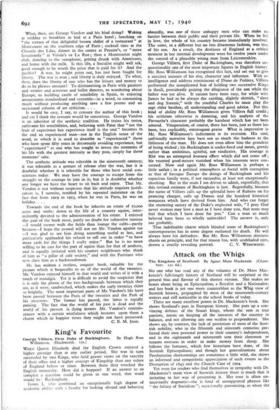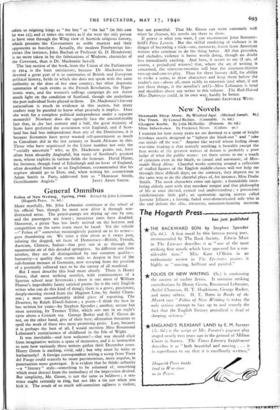Attack on the Whigs
No one who has read any of the volumes of Dr. Mure Mac- kenzie's full-length history of Scotland will be surprised at the general bias and flavour of this shorter version. She makes no bones about being an Episcopalian, a Royalist and a Nationalist; and her book is yet one more counterblast to the Whig view of Scottish history, propagated by most of the nineteenth-century writers and still noticeable in the school books of today.
There are many excellent points in Dr. Mackenzie's book. She shows Scotland's part in European history. She puts up a con- vincing defenct of the Stuart kings, whom she sees as true patriots, intent on keeping all the interests of the country in balance, and not allowing any one section to preponderate. She shows up, by contrast, the lack of patriotism of most of the Scot- tish nobility, who in the fifteenth and sixteenth centuries pre- ferred their own personal power to their country's independence, and in the eighteenth and nineteenth sent their clansmen or tenants overseas in order to make money from sheep. She follows the fortunes, which few historians have done, of the Scottish Episcopalians; and though her generalisations about Presbyterian shortcomings are sometimes a little wild, she shows an informed and sympathetic appreciation of such events as the Disruption of 1843 and the Church Case of 1904.
Yet even for readers who find themselves in sympathy with Dr. Mackenzie's main view of Scottish history there is much that is irritating in her way of presenting it. Her tone is often un- necessarily dogmatic—she is fond of unsupported phrases like "the fallacy of Socialism "; occasionally patronising, as when she refers to reigning kings as "the boy" or "the lad" (in this case he was 22); and at times she writes as if she were the only person to have seen through the Whig view of Scottish religious history, which presents the Covenanters as noble martyrs and their opponents as butchers. Actually, the modem Presbyterian his- torian (for instance, John Buchan or Professor G. D. Henderson) is no more taken in by the fabrications of Wodrow, chronicler of the Covenant, than is Dr. Mackenzie herself.
The last section of the book, from the Union of the Parliaments to 1914, is the least satisfactory, because Dr. Mackenzie has devoted a great part of it to summaries of British and European political history, fields in which she does not speak with the same authority as she does of her own country; her often dogmatic summaries of such events as the French Revolution, the Napo- leonic wars, and the women's suffrage campaign do not throw much light on the condition of Scotland, though she underlines the part individual Scots played in them. Dr. Mackenzie's fervent nationalism is much in evidence in this section, but many readers may be puzzled to know what precisely it implies. Does she wish for a complete political independence under a separate monarch? Nowhere does she squarely face the uncomfortable fact that, in the last century and a half, the great majority of Scots have preferred the association with England; and if Scot- land has had less independence than any of the Dominions, it is because Scotsmen have never wanted self-government as much as Canadians did in the last century or South Africans in this. Those who have acquiesced in the Union number not only the "socially uncertain" who, as Dr. Mackenzie points out, have often been absurdly Anglophil, but many of Scotland's greatest men, whose exploits in various fields she honours. David Hume, for instance, though fond of Edinburgh and no lover of England, often described himself as an Englishman, recommended that his nephew should go to Eton, and, when writing his countryman Adam Smith in Paris, addressed him as "Monsieur Smith,



































 Previous page
Previous page